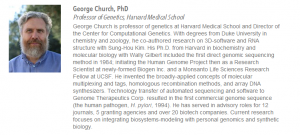
Dear "Bright and Insatiably Curious" 23andMe Customer, Did you Get "Grubered" by George Church?
In a Nature article published in Oct 2013, Harvard professor George Church asked why so few ‘bright and insatiably curious’ people were not getting their genomes sequenced.
Improving genome understanding
Readers of Nature, we can assume, are bright and insatiably curious. So why have so few obtained and interpreted their own genome sequence? We should avoid being judgemental of people who practise genomic modesty or who choose not to act on genome information, but we should also ask if we are providing adequate and equal access to education about the benefits and risks of genome information.
……
It is important for those of us at the sharp end of work on genomics to work equally hard at conversations with the public. We already share our (very revealing) faces, voices and opinions. And, as we share more of our genetics and as we develop genomic progress into precision medicine, researchers and the public alike need frank assessments of all of these tests and treatments. We need the Genomics X Prize more than ever.
Unfortunately, those who fell for that appeal, may have gotten ‘Grubered’ (see video at bottom for meaning of the word) by yet another ivy-league professor. As it turns out, George Church is a member of scientific advisory board of 23andme and his article was a marketing promotion for the company.


It is also clear that 23andme will sell your and your kid’s genetic information to drug companies and other commercial/non-commercial entities.
Surprise! With $60 Million Genentech Deal, 23andMe Has A Business Plan
This is more like it.
A deal being announced today with Genentech points the way for 23andMe, the personal genetics company backed by Facebook billionaire Yuri Milner and Google Ventures to become a sustainable business even if the companys discussions with the U.S. Food and Drug Administration stretch on for years.
According to sources close to the deal, 23andMe is receiving an upfront payment from Genentech of $10 million, with further milestones of as much as $50 million. The deal is the first of ten 23andMe says it has signed with large pharmaceutical and biotech companies.
Such deals, which make use of the database created by customers who have bought 23andMes DNA test kits and donated their genetic and health data for research, could be a far more significant opportunity than 23andMes primary business of selling the DNA kits to consumers. Since it was founded in 2006, 23andMe has collected data from 800,000 customers and it sells its tests for $99 each. That means this single deal with one large drug company could generate almost as much revenue as doubling 23andMes customer base.
If that came as a shocker, please familiarize yourself with the consent form and the privacy statement of 23andme. Will insurance companies also be able to buy your kids’ genetic data and blacklist them for ever based on certain markers? I cannot figure that out from the consent document and assume the worst.
Why so? It is because when these professors are publicly calling you ‘bright and insatiably curious’, it is very likely that between friends they are describing you as too stupid to understand’ legal and marketing documents.
-————————–
Edit.

Boy, oh boy, what is wrong with people in this country? Torture is illegal by Geneva convention and that did not stop Americans to use it. NSA spying on citizens is forbidden by the constitution and that did not stop Google, Microsoft etc. from selling people’s private data to the government. Now you are talking about just a law, which can be easily overturned at a later date through lobbying of insurance companies. Will George Church get your genomics data erased from the servers at that point?
Here is a good example of getting laws inconvenient for big companies overturned, when people are not looking. After 2008 crash, ordinary Americans made a lot of noise and US congress created a law banning banks from using savings of ordinary people to speculate in the derivatives market. That restriction has been removed just before Christmas eve last month.
Ron Paul: Derivatives Bailout In Crominbus Bill An Omen Of Things To Come
Did Wall Street Need to Win the Derivatives Budget Fight to Hedge Against Oil Plunge?
The same will happen to your precious GINA, because far fewer people care about it than those caring about their bank accounts.

-———————————————
Edit - 2.

Here is what it says. They exclude exactly three things - name, contact information and credit card information. Apart from that, I do not see too many restrictions.
Which of my personal information is used for research?
Your genetic data and any other personal information you enter into the website, except for your Registration Information (name, contact information, and credit card information), may be analyzed in the research.
Your name and contact information may be used to communicate with you but are not analyzed in combination with your genetic and other personal information.
Who gets to see my personal information?
23andMes privacy statement outlines who does and does not get access to the personal information of 23andMe customers; here we list the additional individuals who will get access if you consent to take part in research.
Within 23andMe: 23andMe researchers who conduct analyses will have access to your genetic and other personal information, but not to your name, contact, or credit card information. 23andMe researchers who contact you will have access to names and contact information, but only to very limited genetic or other personal information.
Outside of 23andMe: 23andMe may share some data with external research partners and in scientific publications. These data will be summarized across enough customers to minimize the chance that your personal information will be exposed. 23andMe may need to share the information with other agencies as required by law.
-—————————————–
Edit - 3.
Of Course 23andMe’s Plan Has Been to Sell Your Genetic Data All Along
Big data hasexcuse the metaphorbeen in 23andMe’s DNA from the beginning. The company was founded by Anne Wojcicki, who’s married to (though now separated from) Google co-founder Sergey Brin. Last year, Wojcicki told the New York Times that the inspiration for 23andMe came from watching Google: “I remember in the early days of Google, Larry [Page] would say, ‘I just want the world’s data on my laptop.’ I feel the same way about health care. I want the world’s data accessible.”
While Wojcicki has been open about her larger ambitions for 23andMe, none of that language is apparent in the marketing for its DNA test kits to customersfor sneaky but obvious reasons. Its privacy policy notes that it will share aggregated data to third parties (read: sell to pharma and biotech companies) for scientific research if customers sign a consent document. Wojcicki told the San Jose Mercury News that 85 to 90 percent of 23andMe’s customers do.
-——————————————-
Edit - 4.

